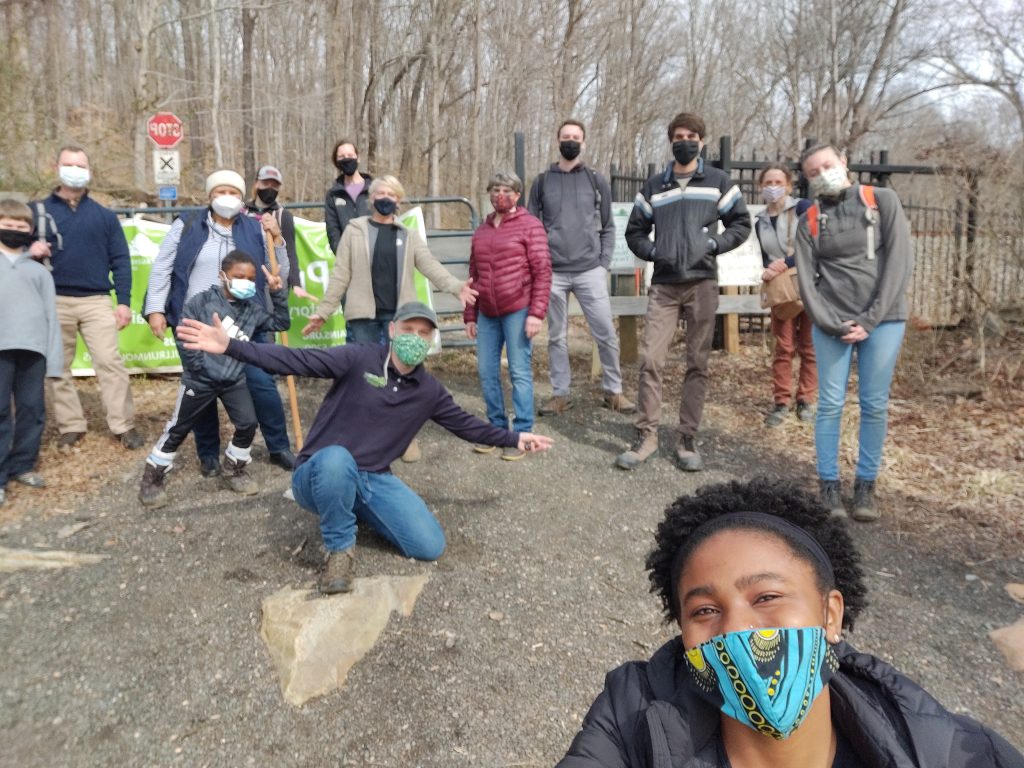“We’ve just been walking together, and we’re already becoming friends!”
This is probably my favorite quote that I’ve heard from the Black/African American hikes at the Preserve.
Keeping that in mind, allow me to reintroduce myself. I am Barinaale Dube, Cultural History Fellow, turned Cultural History Interpreter. I feel like my extended presence at the preserve is a very apt description of the nature of the work. It quite literally draws you in.
One of the pinnacles of our then fellowship and now gainful employment has been the hike. Considering that the entirety of this work has occurred during the first global pandemic in at least a 100 years, it was a relatively safe way to take lovers of the Preserve, people in the community, and life-long learners on this journey with us. Participants sign up online, meet us at the trailhead, and then we literally walk some of the same paths that the families we are researching once did. We stop at cemeteries, still-standing structures, and man-made landmarks to discuss the details of their daily lives. All while discussing a range of topics that either connect us to these families, one another, or a combination of the two. It constantly amazes me how much I learn every time I lead a hike. Because we freely offer up this information, people are encouraged to offer their own experiences and wisdom back, or even include us in various projects or programs.
This concept of “taking people along with us” has always been a foundational pillar of this work for me. There are millions of inaccessible journals, research reports, books and textbooks filled with either antiquated or indecipherable historical information. There are hundreds of classes and conferences constructed to bounce the same schools of thoughts amongst people. Some of the most persistent history that the average person has access to today, is oral.
I couldn’t tell you what 3rd grade textbook I learned about Christopher Columbus in, but I can tell you that in fourteen hundred ninety-two, Columbus sailed the ocean blue. That history was passed down to me orally. In that same way to preserve resources and maximize engagement, there are no pamphlets or fact sheets distributed on our hikes. Everything offered up, is discussed, dissected, and directed back to us in words and ways that will help it stick in our minds.
Between my cultural information, Summers’ geo-spatial analysis, and Joe’s biological insights, we have really been able to offer a very immersive experience. One of the benefits of this being a state-protected preserve, is the ability to offer the experience and the entirety of the south-section of the Preserve freely.
On the hike, when I discuss colonial-capitalistic concepts of ownership, specifically in regards to land, it helps shine light on these notions of nationality that we’ve constructed. I believe it is very important to constantly assert that we are only stewards of this land and information. That is the belief of the people who ancestrally occupied this space, and it also was the belief of the Black people who lived on the mountains as well. That every exchange does not have to be commodified or have a monetary component.
This has really rung true. For Langston, a nine-year old participant on one of our hikes, he really got more than be bargained for. What he probably thought would just be a hike in the woods with his grandmother turned out to be a very rich adventure where he could, “make a friend just by walking together”. That is our continual hope, that as we look back in time at our ancestors or members in our community, we’ll be able to take care of not only the earth, but each other better through what we’ve learned to adopt or lay by the wayside. That these Black/African American hikes at the Preserve offer cultural lessons that have contemporary value that can improve the way we live in community with one another.
That is the beauty of this journey; it’s all open to interpretation.
